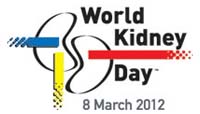Protect Your Kidneys: Control Diabetes, Blood Pressure
 Most people with kidney disease are not aware of their condition. If you have diabetes, talk to your doctor about getting tested for kidney disease. Keep kidneys healthy by controlling your blood sugar and blood pressure.
Most people with kidney disease are not aware of their condition. If you have diabetes, talk to your doctor about getting tested for kidney disease. Keep kidneys healthy by controlling your blood sugar and blood pressure.

March 8 is World Kidney Day, a day dedicated to raising awareness of kidney disease and the importance of its prevention and early detection.
Kidney disease damages your kidneys, preventing them from cleaning your blood as well as they should.
This damage can cause wastes to build up in your body and lead to other health problems, including heart disease, anemia, and bone disease.
Chronic kidney disease eventually can cause kidney failure if it is not treated.
If you do have the disease, it's important to be diagnosed early. Treatment can slow down the disease, and prevent or delay kidney failure. Because chronic kidney disease often develops slowly and with few symptoms, many people with the condition don't realize they're sick until the disease is advanced and requires dialysis. Blood and urine tests are the only ways to tell if you have chronic kidney disease.
Tips for Keeping Your Kidneys Healthy
Steps to help keep your kidneys healthy include the following:
- Keep blood pressure below 130/80 mm/Hg.
- Stay in your target cholesterol range.
- Eat less salt and salt substitutes.
- Eat healthy foods.
- Stay physically active.
- Take your medications as prescribed.
If you have diabetes, take these steps, too:
- Meet blood sugar targets as often as you can.
- Have an A1c test at least twice a year, but ideally up to four times a year. An A1c test measures the average level of blood sugar over the past three months.
If your blood pressure is high, check it regularly and get it under control to make sure your kidneys remain healthy. Talk to your doctor about medicines to lower your blood pressure.
Helping to prevent type 2 diabetes is another important step in preventing kidney disease. Recent studies have shown that overweight people at higher risk for type 2 diabetes can prevent or delay the onset of the disease by losing 5 to 7 percent of their body weight, or 10 to 14 pounds for a 200-pound person. You can do that by eating healthier and getting 150 minutes of physical activity each week (1).
Who Is More Likely to Develop Kidney Disease?
 In addition to diabetes and high blood pressure, other conditions that increase the risk of kidney disease include heart disease, obesity, older age, high cholesterol, and a family history of chronic kidney disease. A physical injury can also cause kidney disease.
In addition to diabetes and high blood pressure, other conditions that increase the risk of kidney disease include heart disease, obesity, older age, high cholesterol, and a family history of chronic kidney disease. A physical injury can also cause kidney disease.
Kidney disease is the eighth leading cause of death in the United States, responsible for the death of more than 50,000 people in 2010 (2). More than 20 million (greater than 10 percent) of U.S. adults have chronic kidney disease and most of them are not aware of their condition (3,4).
More than 35 percent of adults with diabetes have chronic kidney disease (3). High blood sugar (blood glucose) and high blood pressure increase the risk that chronic kidney disease will eventually lead to kidney failure. If you have diabetes, controlling blood sugar and blood pressure reduces the risk of developing kidney disease or may slow its progression (1,3).
Injuries and Infections Can Damage Your Kidneys
Infections – such as those affecting the bladder and kidney – can damage your kidneys, too (5). Call your health care provider if you have any of these signs of bladder infection:
- Cloudy or bloody urine
- Pain or burning when you urinate
- An urgent need to urinate often
Also, speak with your health care provider if you have any of these signs of kidney infections:
- Back pain
- Chills
- Fever
Chronic Kidney Disease Could Lead to Dialysis or a Transplant
 The final stage of chronic kidney disease is kidney failure, or end-stage renal disease. People with kidney failure need dialysis, in which blood is cleaned through a machine, or a new, healthy kidney through transplantation.
The final stage of chronic kidney disease is kidney failure, or end-stage renal disease. People with kidney failure need dialysis, in which blood is cleaned through a machine, or a new, healthy kidney through transplantation.
In 2009, more than 110,000 people in the United States began treatment for kidney failure (6). For every ten new cases, seven had diabetes or hypertension listed as the primary cause (6). In that same year, more than 560,000 people in the United States were living on chronic dialysis or with a kidney transplant (6). Among people on hemodialysis due to kidney failure, the leading causes of hospitalization are cardiovascular disease and infection (6).
Take steps to keep your kidneys healthy. If you have a higher risk of kidney disease, talk to your doctor about getting tested.
References
- Centers for Disease Control and Prevention. National Diabetes Fact Sheet: national estimates and general information on diabetes and prediabetes in the United States, 2011. Atlanta, GA: U.S. Department of Health and Human Services, Centers for Disease Control and Prevention, 2011.
- Murphy SL, Xu JQ, Kochanek KD. Deaths: Preliminary Data for 2010. National Vital Statistics Reports; vol 60 no 4. Hyattsville, MD: National Center for Health Statistics. 2012.
- Centers for Disease Control and Prevention. National Chronic Kidney Disease Fact Sheet: general information and national estimates on chronic kidney disease in the United States, 2010. Atlanta, GA: U.S. Department of Health and Human Services, Centers for Disease Control and Prevention, 2010.
- Plantinga LC, Boulware LE, Coresh J, et al. Patient awareness of chronic kidney disease: trends and predictors. Arch Intern Med.2008;168(20):2268–75.
- Urinary Tract Infections in Adults - National Kidney and Urologic Diseases Information Clearinghouse
- U S Renal Data System, USRDS 2011 Annual Data Report: Atlas of Chronic Kidney Disease and End-Stage Renal Disease in the United States, National Institutes of Health, National Institute of Diabetes and Digestive and Kidney Diseases, Bethesda, MD, 2011.
More Information
- CDC's Chronic Kidney Disease Initiative
- National Chronic Kidney Disease Fact Sheet, 2010
- World Kidney Day
- Frequently Asked Questions: How Can Diabetes Affect the Kidneys?
- CDC's Division of Diabetes Translation (also available in Spanish)
- Prevent Diabetes
- Prevent High Blood Pressure
- National Kidney Disease Education Program
- United States Renal Data System
- Dialysis Bloodstream Infection Prevention Collaborative
- Kidney Health [PODCAST - 01:00 minute]
- Kidney Health [PODCAST - 03:40 minutes]
- Salud de los riñones (Kidney Health) [PODCAST - 01:19 minutes])
- Send a Health-e-Card
CDC works 24/7 saving lives and protecting people from health threats to have a more secure nation. A US federal agency, CDC helps make the healthy choice the easy choice by putting science and prevention into action. CDC works to help people live longer, healthier and more productive lives.
Get email updates
To receive email updates about this page, enter your email address:
Contact Us:
- Centers for Disease Control and Prevention
1600 Clifton Rd
Atlanta, GA 30333 - 800-CDC-INFO
(800-232-4636)
TTY: (888) 232-6348 - cdcinfo@cdc.gov




